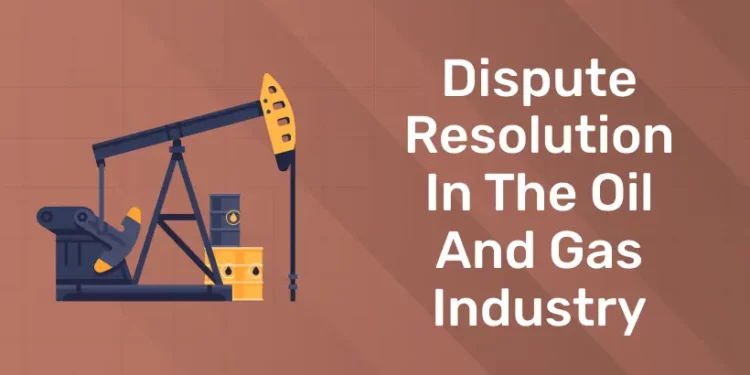Table of Contents
Conflicts and disputes in the oil and gas industry are common and are multifaceted. The disputes in the oil and gas industry enclose diverse areas. Some of the major disputes in the oil and gas industry concern joint venture conflicts, investor claims, maritime boundary disputes, and employee grievances.
Disputes revolve often around ownership issues, service contract rights, obligation licenses, joint managing contracts, and sales arrangements. There is no typical claim for the dispute etc. Know more about the dispute resolution techniques in the oil and gas industry.
The scope of disputes in the oil and gas industry is expansive. As it lacks a typical claim, the oil and gas industry opens up ways for multiple disputes. Some of the major oil and gas industry claims rightfully include the claims that are important to the growth and development of the oil and gas industry.
About offshore fields, maritime frontier conflicts between states occur. Under the bilateral investment treaties (BITs), investor claims develop. Also, under the multilateral investment treaties (MITs) and Energy Charter Treaty (ECT), disputes among service providers, joint venture partners etc occur.
Get Certified! Get Confident! Join our Oil and Gas Course!
The claims initiated by the employees are also a reason for the dispute. Nevertheless, the disputes that are common in the oil and gas industry occur under the following conditions:
- Under production sharing contracts (PSCs), the dispute occurs between oil and gas companies and the keeping country concerning privileges and responsibilities including ownership, capitulations etc
- Under the joint operating agreement (JOA), the dispute occurs between the industries investigating hydrocarbons and assembling them
- Disputes arising from the drilling right contract based on the contracts for the supply of equipment or services
- Disputes based on the sales contracts of resources including liquefied natural gas (LNG), crude oil and natural gas.
Financial aspects play a major role in determining the frequency of disputes happening in the oil and gas industry. The expense of crude oil has a pivotal role in the commonness of disputes.
The political environment and regulatory frameworks help in adding to the plurality of disputes within the oil and gas industry. Disputes in the oil and gas industry generally arise from debates or controversies not only in the risk allocation but also in hydrocarbon rights, and pricing of the resources. Many of such topics lead to the origin of the altercations within the oil and gas enterprise.
Get Certified! Get Confident! Join our Oil and Gas Course!
Types of Disputes
The oil and gas industry is regarded as one of the most popular and controversial industries. The oil and gas industry is open to arguments. There are different disputes arise in the oil and gas industry. The oil and Gas industry has been continuously evolving for the past few years.
The different companies and the parties involved in the oil and gas production and processing can be part of the dispute. Disputes may arise between the oil extracting country and the host, between the host and foreign country, the oil industry and different countries, landowners and companies.
The modification in the regulatory requirements risks diluting the significance of the scheme with references to taxation and as a consequence disputes occur. The lease conflict is the most familiar and common dispute in the oil and gas industry.
There are different types of disputes in the oil and gas industry. Refer below for the various disputes that constantly occur in the oil and gas industry.
Get Certified! Get Confident! Join our Oil and Gas Course!
Contractual Disputes
The controversies that arise from disagreements in the contract result in contractual disputes. If the agreement is broken over time, the oil and gas industry faces conflicts. It can be on the grounds of the rate of the job timeline, payment assistance, or explicit contractual debts that are exactly applicable in the oil and gas industry.
Joint Venture and Partnership Disagreement
The Joint Venture and Partnership Disagreement is a dispute which involves the conflict between the joint ventures or partners involved in the oil and gas industry. The dispute can be based on the control over the decision-making, production, distribution, operations, profit and loss in the ventures associated with the oil and gas industry.
Nationalism and Expropriation-Based Disputes
The Nationalism and Expropriation disputes include the government activities that may impact the property privileges concerned in the oil and gas industry. The investment can be a main reason for the conflict especially the nationalization of the asset. The dispute may also emerge for the reason of fair remuneration.
Regulatory and Compliance Disputes
Set by the government organizational bodies that set the safety standards and environmental regulations can lead to regulatory and compliance issues as the oil and gas industries fail to adhere to the set standards.
Investment Treaty Disputes
Investment Treaty Disputes occur based on the treaty disputes occurring between the host nations and foreign investors involved directly and indirectly in the oil and gas industry. If differences and changes in the policies and regulations occur it can lead to problems in the investment.
Pricing and Valuation Disputes
When the disagreement occurs from the company’s disagreement over the changes in the market prices. The disagreement in the asset valuation related to the oil and gas industry can also be part of the dispute
Liability and Insurance Disputes
Based on the insurance coverage and liability issues related to the mishandling occurring in the operations in the oil and gas industry, the insurance and liability issues occur.
Resolution Techniques
When disputes occur in the oil and gas industry, there are five major conflict resolution strategies developed to save the situation in the oil and gas industry. It includes competing, accommodating, collaborating avoiding, and compromising.
The most famous and commonly used ADR methods should be understood on a deeper level to have a grip on the oil and gas industry. The two commonly used ADR methods involve:
- Expert determination
- Mediation
The technical and accounting conflicts are considered to be expert determination. All the other disputes come under the category of arbitration. Multi-stage dispute solution mechanisms are used frequently.
Get Certified! Get Confident! Join our Oil and Gas Course!
They supervise to furnishing of a statement of disagreement to be delivered. Between the senior executives negotiation, and mediation can be regarded.
Transnational commercial or investment acquisition compact arbitration is a prevailing procedure for determining controversies in the oil and gas sector, offering an effective resolution for disputes.
Entri’s oil and gas online coaching will guide you to properly place yourself in the oil and gas industry with a high salary and career growth. The aspirants who wish to elevate their career in the oil and gas industry can choose Entri as the best learning platform.
Get Certified! Get Confident! Join our Oil and Gas Course!
Entri’s oil and gas online coaching provides you with a job-oriented curriculum, live projects, a full-time assignment support team and self self-paced learning environment in your native language. The guidance will be given by the industry professionals once you enrol on the Entries oil and gas industry.
The daily mock test, demo sessions, revision sessions etc will be provided. Entri’s oil and gas industry will provide you with soft skill sessions along with real-time interactions. Other perks of joining Entri include:
- Increased Engagement
- Affordability
- Increased Engagement
- Flexible and Convenient
- Up-to-date information
The oil and gas industry is always engaged in dispute solutions in the power sector and it will resume. The oil and gas industry is constantly evolving. The oil company disputes even go to the extent of court cases and is more flexible when compared to other sectors. The arbitration in the oil and gas industry is showing a bright future.
Frequently Asked Questions
Why is the oil and gas industry famous for disputes?
The scope of disputes in the oil and gas industry is expansive. As it lacks a typical claim, the oil and gas industry opens up ways for multiple disputes. Some of the major oil and gas industry claims rightfully include the claims that are important to the growth and development of the oil and gas industry.
What are Liability and insurance disputes?
The insurance coverage and liability and issues related to the mishandling occur in the operations in the oil and gas industry, the insurance and liability issues occur.
What are the famous resolution techniques?
When disputes occur in the oil and gas industry, there are five major conflict resolution strategies developed to save the situation in the oil and gas industry. It includes competing, accommodating, collaborating avoiding, and compromising.
What are Contractual Disputes?
The controversies that arise from disagreements in the contract result in contractual disputes. If the agreement is broken over time, the oil and gas industry faces conflicts
How are different companies related to the disputes?
The different companies and the parties involved in the oil and gas production and processing can be part of the dispute. Disputes may arise between the oil extracting country and the host, between the host and foreign country, the oil industry and different countries, landowners and companies.











